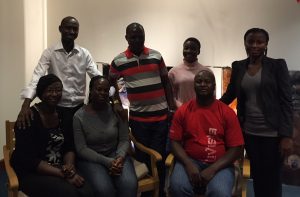 The University of Rhode Island Coastal Resources Center (URI CRC) is proudly hosting seven graduate students from Africa, with affiliations at several colleges, who are, with CRC guidance, pursuing URI master’s and doctoral degrees in varied fields to ultimately help build the capacity of their own communities to engage in innovative coastal management planning and practice. CRC is engaged in extensive coastal management and fisheries related projects in the countries of Ghana and Malawi; bolstering the professional development of emerging leaders and in-country practitioners is a critical aspect of the work — a focus emphasized by URI President David M. Dooley at his recent meeting with University of Cape Coast/Ghana (UCC) leadership to initiate a learning exchange between the schools. Funding for the graduate student effort is provided by the U.S. Agency for International Development (USAID). While one student, Evans Arizi of Ghana, is already well underway with his URI study program, six more are embarking this semester. From Ghana: Rosina Cobbina, Ivy Gyimah, Vida Osei and Evelyn Takyi. From Malawi: Innocent Gumulira and Elliot Lungu. Please join CRC in extending a warm welcome to this student group.
The University of Rhode Island Coastal Resources Center (URI CRC) is proudly hosting seven graduate students from Africa, with affiliations at several colleges, who are, with CRC guidance, pursuing URI master’s and doctoral degrees in varied fields to ultimately help build the capacity of their own communities to engage in innovative coastal management planning and practice. CRC is engaged in extensive coastal management and fisheries related projects in the countries of Ghana and Malawi; bolstering the professional development of emerging leaders and in-country practitioners is a critical aspect of the work — a focus emphasized by URI President David M. Dooley at his recent meeting with University of Cape Coast/Ghana (UCC) leadership to initiate a learning exchange between the schools. Funding for the graduate student effort is provided by the U.S. Agency for International Development (USAID). While one student, Evans Arizi of Ghana, is already well underway with his URI study program, six more are embarking this semester. From Ghana: Rosina Cobbina, Ivy Gyimah, Vida Osei and Evelyn Takyi. From Malawi: Innocent Gumulira and Elliot Lungu. Please join CRC in extending a warm welcome to this student group.
Tag Archives: capacity development
CRC Gives Grad Student from Ghana Opportunity to Make a Difference
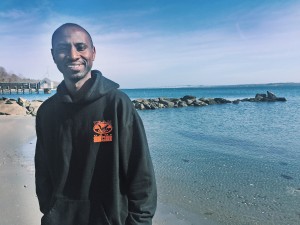
As a young boy growing up in a coastal village in Ghana, URI graduate student Evans Arizi could see the economic importance of fish.
He saw local fishermen in Metika and Anlomatuope — fishing villages near the border of Ghana and Cote d’Ivoire in West Africa — paddle their canoes into the waves and watched international boats cast nets into the water to reel in Ghana’s main source of protein.
He also saw how frequently fishing resources were exploited.
“The challenges are many,” Arizi, 29, says. “Some fishermen are using inadvisable methods of fishing, and the territorial waters are not protected due to insufficient logistics, so anyone can come in there and fish.”
In Ghana, lack of government investment in sustainable fishing policies has created a plethora of problems with illegal fishing. Because fishing laws are not properly enforced, vessels frequently use incorrect gear, like nets that are too small to free bycatches and immature fish, therefore increasing their catch and profits but depleting the stock of young fish before they can reproduce. Though fishermen are supposed to report juvenile catches, many do not out of fear of punishment. Arizi says local fishermen sometimes adhere to practices that pollute waters and lead to species degradation.
“Local authorities back these illegal practices out of greed,” he says. “(They think,) ‘Let me think of my stomach, let me not think of others.’ ”
Arizi aims to help change that culture at home, and the path to that goal has taken him to URI. He was introduced to the university through CRC. As an undergraduate, he participated in a fish stock assessment training program that was part of a CRC sustainable fisheries project in Ghana, which “provided many useful relevant materials” to local fishing communities, he says.
CRC currently leads a group of partners in the five-year Sustainable Fisheries Management Project in Ghana funded by the United States Agency for International Development (USAID/Ghana SFMP). The project aims to improve conditions for sustainable local fishing practices, help fishing communities become stewards of their resources, strengthen information systems for managing fisheries and increase awareness for protecting fisheries ecosystems and the people who rely on them for their livelihoods, among other goals.
To help create the next generation of fisheries scientists and leaders in Ghana, the project is facilitating student exchanges and scholarship opportunities at URI in collaboration with the University of Cape Coast in Ghana, Arizi’s alma mater. Through CRC, Arizi applied for a scholarship to earn a PhD in Biological and Environmental Sciences at URI. He was accepted and moved to URI to begin the three-and-a-half-year program in January. It was his first time outside of Ghana.
“When the opportunity came for me to come here I was so excited,” Arizi says. “I felt that by coming here I would get the necessary materials and resources to be equipped to handle the opposition (to implementing and enforcing sustainable fishing laws in Ghana).”
Before coming to URI, Arizi worked as a principal research assistant for the Department of Fisheries & Aquatic Sciences at the University of Cape Coast in Ghana. That experience, his fieldwork with CRC and his course work as an undergrad and graduate student at the university in Ghana brought the fisheries challenges into sharp focus. Much of it comes down to competition, Arizi says.
“When an individual spots a friend doing such an unwarranted act (like illegal fishing practices), he will decide to do the same,” Arizi says. While he believes the government needs to implement and enforce fishing laws recommended to them by many — including SFMP, which helped the country draft the recently adopted National Fisheries Management Plan — the most important change needed is in the behavior of fishermen.
“The fishermen have to change their behavior and also put their trust in others, he says.
Arizi hopes that his wife, whom he married a month before moving to Rhode Island, eventually can join him. Currently, however, his main focus is his studies. “I don’t want to get any Cs, not at all, so I have to work hard,” Arizi says. “My wife keeps on encouraging me to do well.” He is the first member of his family to go to college; however, he hopes his six siblings can follow his lead.
Though Arizi says that working to excel in his five classes often means waking up early in the morning and staying up late at night, he likes graduate school.
“God has done a lot for me, because of all my friends who started out in school at the same time, I’m the only one who made it to this level,” Arizi says. “I like education; knowledge is power.”
— Allison Farrelly
Ghana University Officials to Visit URI As Part of $24 Million Sustainable Fisheries Project

A delegation from the University of Cape Coast in Ghana will visit the University of Rhode Island next week as part of a $24 million sustainable fisheries project led by the Coastal Resources Center (CRC) at URI’s Graduate School of Oceanography.
The Ghana delegation will meet with URI President David M. Dooley Jan. 27 to expand on a memorandum of understanding that the universities signed in May 2015.
The agreement includes opportunities for cooperative research as well as faculty and student exchanges in Ghana and at URI. The West African university has a longstanding partnership with URI through CRC-led coastal management and food security projects in Ghana. Currently, CRC is leading the implementation of the five-year, $24 million United States Agency for International Development Ghana Sustainable Fisheries Management Project. The USAID grant is the largest ever awarded to URI.
Two fisheries experts from URI’s coastal center, Brian Crawford, in-country project director, and Najih Lazar, senior fisheries advisor, have been living in Ghana for the past year to help lead the project. Its goal is to revitalize marine fisheries stocks through responsible fishing practices and improved governance and ultimately benefit the more than 100,000 women and men involved in the Ghana fishing industry.
As part of this project, CRC and URI are working to build the research, educational and outreach capacity of the University of Cape Coast in coastal and fisheries management.
“Collaboration with the University of Cape Coast is an important element of the project, as one of the critical objectives of it is to build the skills and knowledge of Ghanaian stakeholders so they can continue the vital work of sustaining their fisheries sector and coastal communities long after this URI-led project has ended,” said Donald Robadue, sustainable fisheries project manager at CRC.
Leaders from both universities will discuss several aspects of the collaboration, with particular emphasis on student and faculty exchanges. These include developing an undergraduate program for URI students in Ghana during J Term, identifying areas of joint research among faculty, exploring opportunities for professional development and examining other areas of potential cooperation in marine fisheries, aquaculture and coastal resources.
The University of Cape Coast delegation also will visit URI’s Narragansett Bay Campus to meet with Graduate School of Oceanography Dean Bruce Corliss and talk with CRC colleagues about the details of the ongoing collaboration.
Ghana Fisheries Course Stresses Inclusion, Building Cohesion
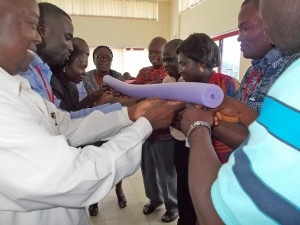
If a problem is systemic, then addressing it at identified critical points might be the best way to solve it. The URI Coastal Resources Center (CRC)-led Leadership for Fisheries Management program that recently concluded in Ghana, Africa, took that approach, both in and out of the classroom.
CRC, based at the Graduate School of Oceanography, and the College of the Environment and Life Sciences’ Fisheries Center have come together for years to offer such programs on campus and across the globe. This 10-day Ghana course differed a bit in that it brought together two dozen participants from all parts of the Ghanaian fisheries system (and one from Malawi)—from chief fishermen and women processors in villages, to boat owners, to government officials and representatives from non-governmental organizations.
“One of the strengths was that you had people from throughout the system, and you had everyone talking to each other, which is unique for Ghana,” said Glenn Ricci, a coastal manager at CRC and co-leader of the course along with Kathy Castro of the Fisheries Center.
In addition, the course was offered early in the tenure of the CRC-led USAID/Ghana Sustainable Fisheries Management Project (SFMP), which aims to help Ghana rebuild its collapsing small pelagic fishery, providing a broad window of opportunity for learning and implementation. “The primary difficulty is that even though there are strict rules and regulations in place, very few people are complying with them,” Castro said. SFMP and the fisheries leadership courses strive to change that.
The program, hosted at the University of Cape Coast (UCC), included faculty participants with the aim of building their capacity to offer these courses in the future. Next year, SFMP and UCC will co-facilitate and jointly implement the course.
Unlike some of the fisheries management programs CRC offers, which focus more on the technical aspects of fisheries, this course focused more on building leadership skills and empowering participants to understand that they can influence behavior throughout the fisheries system. The program covered how to influence people, how to understand your role in influencing positive behavior change, how to address conflict through finding common interest and understanding with those you might think you share no common ground.
With SFMP now underway, “there will be a great deal of follow on. We will offer programs like this twice a year. We want to create a group of 100 leaders throughout the fisheries system, strengthen their knowledge and ability to influence discussions from the local to the regional and national level. The courses are just a small part of a larger capacity development strategy to foster learning outside of the classroom,” Ricci said.
Ghana’s small pelagic fishery is crucial to its food security, and with SFMP, the timing is perfect for supporting a cadre of local people who can lead the country toward some tough decisions on how to reduce fishing effort in hopes of rebuilding fish stocks. For a renewed strategy to work, all stakeholders throughout the fishery system have to believe in the actions, despite low levels of trust and a history of ineffective management. Improved relations across the fishery system can make a new small pelagics fishery management plan more meaningful going forward.
In addition to classroom instruction in leadership, goalsetting, developing co-management plans and creating action plans, the group did a preliminary community analysis and then ran a stakeholder meeting in the fishing village of Elmina, Castro explained. This gave them hands-on experience to understand how local people see the way forward, what their visions are and to learn to listen more and talk less: a skill critical to being a successful leader. “It was very good for them to talk and listen to each other,” she said.
One message that emerged is that women fish processors have a good deal of power in the fisheries system. Many own boats and decide what fish to buy. “If organized, they could really influence the system,” Ricci said, much as the women in Cayar, Senegal, have as part of the CRC-led USAID/COMFISH project.
SFMP is there to guide and support Ghanaians’ progress toward a sustainable fishery, “but really it’s for them to do,” Ricci said. “The goal is to develop a viable network of informed, motivated people that understand the fisheries system and the power of vision driven changes.”
Throughout the tenure of SFMP, which concludes in 2019, CRC will return to Ghana with additional programs that build individual capacity that then strengthens the organization and ultimately the institutions and networks made up of those individuals and groups.
“It’s the follow-up, learning by doing method. It’s the CRC way,” Ricci said.
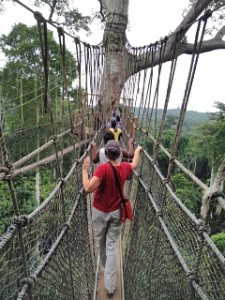
CRC’s Ricci Contributes to IUCN Protected Area Management Book
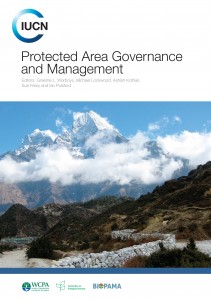 CRC Coastal Manager Glenn Ricci has co-authored a chapter on Capacity Development in the International Union for Conservation of Nature (IUCN) “Protected Area Governance and Management Book,” a free resource for students and practitioners around the globe.
CRC Coastal Manager Glenn Ricci has co-authored a chapter on Capacity Development in the International Union for Conservation of Nature (IUCN) “Protected Area Governance and Management Book,” a free resource for students and practitioners around the globe.
Ricci was asked to contribute to the book because of CRC’s participation in groundbreaking capacity development work through the Western Indian Ocean-Certification of Marine Protected Area Professional (WIO-COMPAS) program. Ricci led that initiative for CRC and was asked to serve on the IUCN Capacity Development Working Group. Ricci also is working on a longer guidance document focused on performance assessment tools for protected area professionals that will be released later this year. The working group and the publications are part of a larger effort to improve the performance of marine protected area staff around the world, and in turn better protect their resources.
The editors state in the foreword of the IUCN book: “Achieving more effective and equitable management requires the appropriate capacity among all institutions and individuals involved. This volume provides an accessible and valuable resource to underpin future capacity development efforts.”
University Partner in Ghana Awarded USAID Capacity Development Grant
The United States Agency for International Development (USAID), a frequent funding partner of CRC, officially committed $5.5 million dollars to the University of Cape Coast (UCC) in Ghana for a five-year program in fisheries and coastal management capacity development. Last month two UCC officials visited CRC and URI to explore how best to implement such a program. The visit was arranged as part of the CRC-led, USAID-funded Sustainable Fisheries Management Project (SFMP) in Ghana. One of the objectives of that five-year, $24-million project is to strengthen UCC’s fisheries and coastal management department by hosting at URI up to 10 masters and doctoral students from UCC, sponsoring other student and faculty exchanges, conducting joint research and holding a fisheries leadership course in Ghana that draws on URI’s experiences.
This new USAID award will fund the creation of a coastal management center at UCC. You can read the the local Ghanaian media reports here:
http://vibeghana.com/2015/02/01/ucc-usaid-to-improve-fisheries-coastal-management-in-ghana/
http://news.peacefmonline.com/pages/social/201502/230872.php


